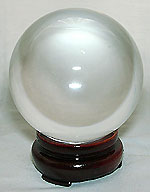Bending the Third Rail
Because We Should, We Can, We Do
Cost of the War in Iraq
(JavaScript Error)
Tuesday, September 19, 2006
Crystal Balls
 Barry points us to some factual justifications for something we've always suspected about economists and economic forcasts:
Barry points us to some factual justifications for something we've always suspected about economists and economic forcasts: 1. The forecasting skill of economists is on average about as good as guessing. In fact, predictions by the politically driven Council of Economic Advisors, Federal Reserve Board and Congressional Budget Office were often worse than guessing.These conclusions, and the justification for them, can be found in this book by William Sherdan. This suggests that my economic guesses about as good as a pro's!
2. Economists cannot predict the turning points in the economy. Of 48 predictions made by economists, 46 missed the turning points.
3. Economic forecasting accuracy declines with longer lead times.
4. No economic forecasters consistently lead the pack in accuracy.
5. No economic ideology consistently produces superior forecasts.
6. No economic forecaster has consistently higher forecasting skills predicting any particular economic statistic.
7. Consensus forecasts do not improve accuracy (although the press loves them).
8. Psychological bias affects forecasters and their forecasts. Some economists are naturally optimistic and bullish, others are consistently pessimistic bears.
9. Increased sophistication provides no improvement in forecasting accuracy. Remember the Long-Term Capital Management hedge fund? Two brilliant Nobel Economists backed by Wall Street's elite nearly sabotaged the world economy.
10. Finally, Sherden says there's no evidence that economic forecasting has improved in recent decades. In fact, forecasting appears to be deteriorating as partisan politics, Wall Street gaming and unpredictable global events invent new illusions.
1 Comments:
 Lynne said...
Lynne said...
That's because, as author Hugh Prather points out, there are no absolutes with something as relative as a human being.
About Me
- Name: Greyhair
- Location: Wine Country, California
I'm a very lucky person with every allergy known to man but still happy to be enjoying a wonderful life living in the best place in the world!
Blogroll
The Big PictureBillmon
Blah3.com
Born at the Crest of Empire
Eric Alterman
Eschaton
FireDogLake
Feingold's Blog
Dan Froomkin
The Huffington Post
Hullabaloo
The Illustrated Daily Scribble
Jesus General
Juan Cole
Matilda's Advice and Rants
Mia Culpa
MsJan Quilts
Needlenose
The Oil Drum
Political Animal
Political Wire
Spooks of the Ozarks
Talk About Corruption
TalkLeft
Think Progress
War and Peace
The Washington Note